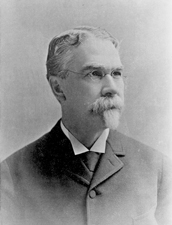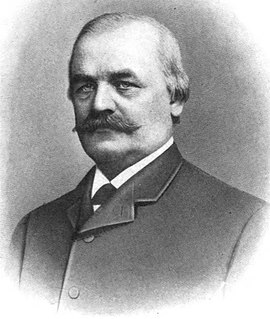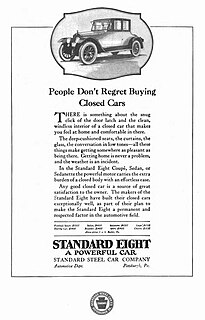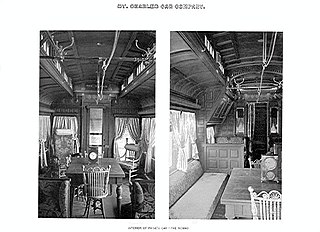Related Research Articles

The Pullman Company, founded by George Pullman, was a manufacturer of railroad cars in the mid-to-late 19th century through the first half of the 20th century, during the boom of railroads in the United States. Through rapid late nineteenth century development of mass production, and takeover of rivals, the company developed a virtual monopoly on production and ownership of sleeper cars.

James McMillan was a businessman and a Republican U.S. Senator from Michigan, as well as the chair of the McMillan Commission.

John Stoughton Newberry was an American industrialist and politician. He served as the first provost marshal for the State of Michigan and as a U.S. Representative from the state of Michigan.

The Grand Trunk Western Railroad Company is an American subsidiary of the Canadian National Railway operating in Michigan, Illinois, Indiana, and Ohio. Since a corporate restructuring in 1971, the railroad has been under CN's subsidiary holding company, the Grand Trunk Corporation. Grand Trunk Western's routes are part of CN's Michigan Division. Its primary mainline between Chicago and Port Huron, Michigan serves as a connection between railroad interchanges in Chicago and rail lines in eastern Canada and the Northeastern United States. The railroad's extensive trackage in Detroit and across southern Michigan has made it an essential link for the automotive industry as a hauler of parts and automobiles from manufacturing plants.

ACF Industries, originally the American Car and Foundry Company, is an American manufacturer of railroad rolling stock. One of its subsidiaries was once (1925–54) a manufacturer of motor coaches and trolley coaches under the brand names of (first) ACF and (later) ACF-Brill. Today, the company is known as ACF Industries LLC and is based in St. Charles, Missouri. It is owned by investor Carl Icahn.

Charles Lang Freer was an American industrialist, art collector, and patron. He is known for his large collection of East Asian, American, and Middle Eastern Art. In 1906, Freer donated his extensive collection to the Smithsonian Institution, making him the first American to bequeath his private collection to the United States. To house the objects, including The Peacock Room by James McNeill Whistler, Freer funded the construction of the Freer Gallery of Art in Washington, D.C.

The Standard Steel Car Company (SSC) was a manufacturer of railroad rolling stock in the United States that existed between 1902 and 1934.

Henry Bourne Joy was President of the Packard Motor Car Company, and a major developer of automotive activities as well as being a social activist.

St. Charles Car Company, a railroad rolling stock manufacturing company located in St. Charles, Missouri, was founded in 1872 or 1873. In 1899 it merged with twelve other companies to form American Car and Foundry (ACF). The St. Charles plant became the main passenger car works. With a failing market for steel passenger cars, ACF phased out the St. Charles operation in 1959.

McMillan is an unincorporated community in Luce County in the U.S. state of Michigan. The community is located along M-28 within Columbus Township. As an unincorporated community, McMillan has no legally defined boundaries or population statistics of its own but does have its own post office with the 49853 ZIP Code.
The Michigan-Peninsular Car Company was a railroad rolling stock manufacturing company formed from the merger of five manufacturing companies in 1892. It was Detroit's largest manufacturer before the rise of the automotive industry.
The Peninsular Car Company was a railroad rolling stock manufacturer, founded by Charles L. Freer and Frank J. Hecker in 1885.
The Detroit, Mackinac and Marquette Railroad was a land grant railroad that was built and operated briefly (1881–1886) in the Upper Peninsula of the U.S. state of Michigan. Incorporated in 1879, the 151.9-mile (244.5 km)-long railroad began operations in 1881. It was intended to help the economic development of a region of frontier timberland along the shores of Lake Michigan and Lake Superior. Its successor line was the Duluth, South Shore and Atlantic Railway.

The Col. Frank J. Hecker House is a historic home in Detroit built in 1888 for local businessman and railroad-car manufacturer Colonel Frank J. Hecker. Located at 5510 Woodward Avenue, it was designated a Michigan State Historic Site in 1958. It is located near to the East Ferry Avenue Historic District and Cultural Center Historic District, and was listed on the National Register of Historic Places in 1971. The house has been owned by Wayne State University since September 2014.

Frank J. Hecker was an American businessman in the railroad-car manufacturing business. Hecker was from Detroit, Michigan.

Eber Brock Ward was an American industrialist, iron and steel manufacturer, and shipbuilder. He was known as the "steamship king of the Great Lakes" and the "first of the iron kings." Ward became Detroit's first millionaire. His steel factories made him the wealthiest man in the Midwest, in his time.
The Standard Steel Casting Company, commonly referred to as Thurlow Works, was a steel production and steel casting facility founded in Chester, Pennsylvania in 1883 by shipbuilder John Roach. The company was established primarily to supply steel ingots for Roach's steel mills, which included the Chester Rolling Mill and the Combination Steel and Iron Company, although it also manufactured steel castings. Standard Steel was the first company in the United States to manufacture commercial quantities of steel utilizing the acid open hearth process.

Frederic Latta Smith was a pioneer of the automobile business. He was one of the founders of the Olds Motor Works in 1899 and of General Motors Corporation in 1908. He was also the president of the Association of Licensed Automobile Manufacturers in its early years.
Michigan Stove Company was originally an enterprise started by Jeremiah Dwyer and his brother in the mid nineteenth century. Their career background training was in the foundry business. They started a Detroit, Michigan company that eventually developed into a joint stock company called the Detroit Stove Works. Dwyer reorganized this firm in 1871 with another set of investors and it became the Michigan Stove Company. They manufactured cooking stoves, heaters, and furnaces under their "Garland" brand. The company was known for its state of the art technology in foundry applications. It was considered to be the world's largest producer of stoves and ranges with its 700 styles and sizes. The company had branch offices in the largest U.S. cities, as well as global distribution arrangements.
References
- ↑ Michiganrailroads.com. "RRHX: Railroad History of Michigan." Archived 2008-04-30 at the Wayback Machine
- ↑ May, George S., Encyclopedia of American Business History and Biography, Bruccoli Clark Layman, 1990, ISBN 0-8160-2084-1
- ↑ Thomas Klug, "Railway Cars, Bricks, and Salt: The Industrial History of Southwest Detroit before Auto," Presentation, November 5, 1999, Marygrove College, Detroit.
- ↑ May, p. 286